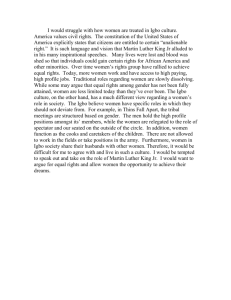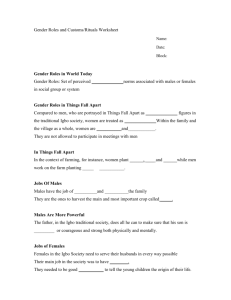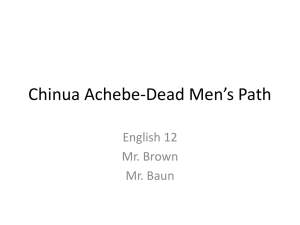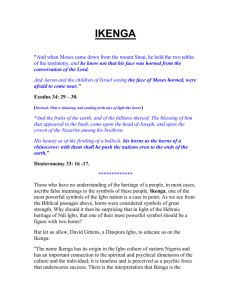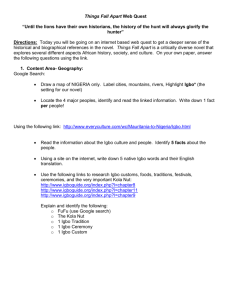kanu-the quest for the nature of being in african philosophy ft 2
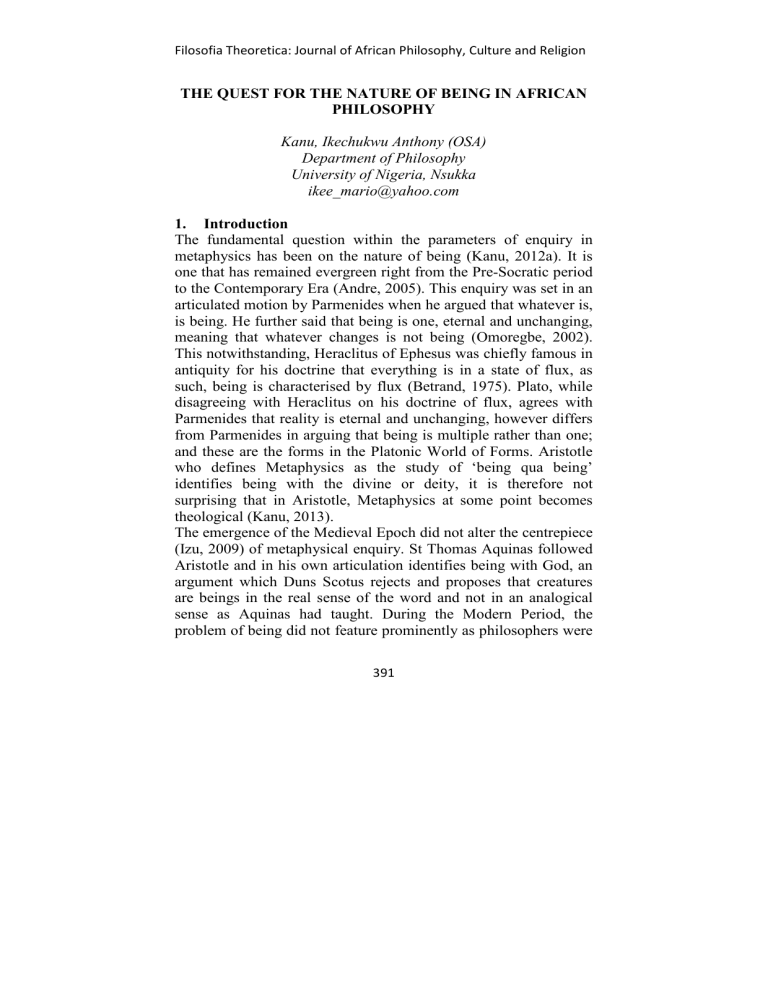
Filosofia Theoretica: Journal of African Philosophy, Culture and Religion
THE QUEST FOR THE NATURE OF BEING IN AFRICAN
PHILOSOPHY
Kanu, Ikechukwu Anthony (OSA)
Department of Philosophy
University of Nigeria, Nsukka
ikee_mario@yahoo.com
1.
Introduction
The fundamental question within the parameters of enquiry in metaphysics has been on the nature of being (Kanu, 2012a). It is one that has remained evergreen right from the Pre-Socratic period to the Contemporary Era (Andre, 2005). This enquiry was set in an articulated motion by Parmenides when he argued that whatever is, is being. He further said that being is one, eternal and unchanging, meaning that whatever changes is not being (Omoregbe, 2002).
This notwithstanding, Heraclitus of Ephesus was chiefly famous in antiquity for his doctrine that everything is in a state of flux, as such, being is characterised by flux (Betrand, 1975). Plato, while disagreeing with Heraclitus on his doctrine of flux, agrees with
Parmenides that reality is eternal and unchanging, however differs from Parmenides in arguing that being is multiple rather than one; and these are the forms in the Platonic World of Forms. Aristotle who defines Metaphysics as the study of ‘being qua being’ identifies being with the divine or deity, it is therefore not surprising that in Aristotle, Metaphysics at some point becomes theological (Kanu, 2013).
The emergence of the Medieval Epoch did not alter the centrepiece
(Izu, 2009) of metaphysical enquiry. St Thomas Aquinas followed
Aristotle and in his own articulation identifies being with God, an argument which Duns Scotus rejects and proposes that creatures are beings in the real sense of the word and not in an analogical sense as Aquinas had taught. During the Modern Period, the problem of being did not feature prominently as philosophers were
391
Vol. 2 No. 2 July – December, 2013 more concerned with the problem of substance. The problem however emerged in Hegel, Jean-Paul Sartre and Gabriel Marcel, in whom being became a mystery (Omoregbe, 2002).
These notwithstanding, in recent times, African thinkers have tried to redefine being, moving away from the elusive and unsubstantive concepts employed by their Western counterparts . In this process, they have employed categories common to the experience of the
African. This piece would be concerned with an analysis of the various African perspectives of the nature of being, ranging from
Placid Tempel’s concept of being as force, Alexis Kagame’s concept of being as Ntu, Iroegbu’s understanding of being as belongingness, the perspectives of Okere, Abanuka and Njoku of being as Chi and Edeh’s analysis of being as ife-di.
2.
Being as Force in Placid Tempels
In his work, La Philosophie Bantou Published in 1945, Placid
Tempels set out to help European missionaries understand the thought pattern or worldview of the Bantu people. This he thought, according to Imbo (1998), would make the work of evangelization easier for the European missionaries, and also help them to avoid misunderstanding the people and their culture. In the process of his research, Tempels arrives at a fundamental and underlining factor in Bantu philosophy, which he calls force. While for the Westerner it could be considered as an attribute of being, for Tempels, it is identical with being in Bantu ontology. Tempels (1945) writes:
I believe that we should most faithfully render the Bantu thought in
European language by saying that the Bantu speak, act, live as if, for them, beings were forces. Force is not for them an adventitious, accidental reality. Force is even more than a necessary attribute of being; force is the nature of being, force is being, being is force. (p.
431).
Having described being as force, Tempels goes ahead to differentiate the degree of force in the hierarchy of being. i.
God
392
Filosofia Theoretica: Journal of African Philosophy, Culture and Religion ii.
Spirits of ancestors iii.
Human Beings iv.
Animals v.
Plants vi.
Inanimate Objects
Thus from the above hierarchy, God has a greater force, followed by the Spirit of the Ancestors, then human beings. However, the created universe of the Bantu people is centred on the human force, for everything in the universe is understood only in relation to man. From this perspective, we gather that in Bantu ontology, as in other African worldviews, the cosmos is anthropocentric.
3.
Being as Ntu in Alexis Kagame
Alexis Kagame, in his work Philosophie Bantou-Rwandaise de
L’Etre, shows that he was one among the African philosophers who tried to develop further Tempels’ philosophy of force. He worked among the people of Rwanda who were called
Kinyarwanda and tried to develop their thought through a linguistic ethno-philosophy. According to Njoku (2010), he discovered that Ntu is the category of being or the generic meaning of something. This he classified into four: Umuntu (human beings);
Ikintu (non-human beings); Ahantu (place and time); Ukuntu
(Aristotelian category of quantity). Ntu is the unifying notion among all these, even though God does not belong to it. There is an interaction between all these: Umuntu being a being with intelligence has the consciousness that allows it to use other objects that do not have the same capacity. Thus, Ikuntu is at the disposal of Umuntu for self-actualization. The absence of a place for God in Kagame’s project of being reveals the limitation of the philosophy.
393
Vol. 2 No. 2 July – December, 2013
4.
Being as Belongingness in Iroegbu Iroegbu
Pantaleon Iroegbu, a Nigerian Philosopher, avers that to be is to
belong, thus for him, borrowing from Igbo ontology, Being is
Belongingness.
Igbo Ontology as the Provenance of Being Qua Belongingness
Iroegbu (1995) believes that the Igbo world into which a child is born crying abatala m ya (I have come into it) is made up of seven characteristics: common origin, common world-view, common language, shared culture, shared race, colour and habits, common historical experience and a common destiny (Iroegbu, 1995).
Without any choice of its own, with neither interrogations nor dialogue, the child is made to be an Igbo in its prolixity. Even as the baby sleeps in its cradle, it already has its being, performance and akaraka (destiny) partly enshrined and construed in the Igbo world (Iroegbu, 1995). The communal individuality of the Igbo is expressed in proverbs such as, Ngwere ghara ukwu osisi, aka
akpara ya (If a lizard stays off from the tree, it would stray into danger). This expresses the indisputable and inevitable presence of, not just the family, but the community to which the individual belongs (Iroegbu, 1995). The Igbo’s believe in the Akan saying that “when a man descends from heaven, he descends into a community”. The community rejoices and welcomes his arrival, finds out whose reincarnation he is, gives the person a name and interprets that arrival within the circumstance of the birth. As the child grows, he becomes aware of his dependence on his kin group and community. He also realizes the necessity of making his own contribution to the group (Uchendu, 1965).
The Ontology of Belongingness
Iroegbu (1995) defines belongingness as ‘the synthesis of the reality and experience of belongingness’ (p. 374). In this case, the recipient-subject of belonging is involved: something belongs and it belongs to something. Belongingness is a special noun from the verb ‘to belong’. It means to be part of, Daisein-with or to be a
394
Filosofia Theoretica: Journal of African Philosophy, Culture and Religion member of a group. For instance, ‘I belong to Arondizuogu community’, this gives me rights and privileges that others who do not belong to this community do not have. There is also a possessive nuance of the verb ‘to belong’ (Iroegbu, 2004, p. 7). I can say that the soap belongs to me. In the first nuance, to belong creates a situation of participation and in the second, it creates a situation of possession. There is an ontological nuance of belongingness, which specifies that a thing is because it belongs.
To be is to belong and to belong is to be (Andre, 2005).
According to Iroegbu (1995), the Igbo principle of Egbe bere Ugo
bere (let the kite perch, let the eagle perch) re-enacts the contents and significance of belongingness as the essence and hermeneutic core of reality. He believes that what a being is, is its activity of perching (belonging). To perch is to be. To be is to perch. To be is to belong and to belong is to be. Iroegbu expressed this in a diagram expressing the relationship between perching, belonging and being (Iroegbu, 1995). And this diagram reveals that when one perches, one belongs and when one belongs one becomes.
To perch To belong
To be
When Egbe perches and Ugo perches, they come face to face with each other. They are with each other. They are present to each other. They relate to each other deeply and directly as well as have relationships with other inhabitants of Uwa (world). To relate is to share something: to give and take. They have common projects, needs and desires. Together they struggle to overcome their difficulties and share their joy (Iroegbu, 1995).
395
Vol. 2 No. 2 July – December, 2013
Obviously, the idea of ‘To be is to belong and to belong is to be’ may sound tautological, but it is the definitional circle involved in any description of being as being. This circle will however be clarified as the four Iroegbuian analytic connotations of belongingness is explored.
Be-(I)-on (Be on)
In this case, ‘to belong’ involves ‘being on’ in the Uwa (Uwa is the world in English, but in Igbo it takes up a meaningful depth. It is the entirety of existence, from God the highest being to inanimate beings of our cosmos) from which all concrete realities derive their being. To be on in this sense is to escape the contrary of being off.
For either one is on or he is off. To be off is to cease to exist and to be on is to be (Iroegbu, 1994).
Be- (l)-on-going
Having been given existence in the Uwa, this aspect of belongingness speaks of the being now going on in its Uwa and
Uwaness (Iroegbu, 1995). In this case, Iroegbu suggests that Uwa is the underlying principle in Igbo Metaphysics. This particularly speaks of the process of being, for to remain in being is to proceed in being and not out of being. In this process of being, he makes a difficult synthesis of change and permanence. As the being goes on in being, it maintains its identity even though something in it changes. In ancient philosophy, change and permanence was a bone of contention between Heraclitus and Parmenides, but in Igbo
Metaphysics it is no problem at all. For uwa na-eme ntughari (the world changes), even though, in the midst of the change Uwa bu
otu (the world does not change).
Be-long
To be-long means to abide, to stay or live long (Iroegbu, 1995). In this case, it means that belongingness lives long. As such, the subject of Uwa lives long. This brings in the issue of space and
396
Filosofia Theoretica: Journal of African Philosophy, Culture and Religion time, for belongingness is expressed in space and time. Be-long extends into eternity in Igbo ontology; it goes beyond the present dimension of the Uwa to the Uwa of the ancestors, such that to be and not to be-long is not to be at all (Iroegbu, 1995). While on-
going belongingness may be open-ended, being-long belongingness stretches into everlastingness. As such, in Iroegbu, one becomes through being-on so as to be-going, in other to belong.
Be-longing
This speaks of being and longing to be. It stresses the longing for life and being. It is founded on the awareness that nothing is higher a value than life. Expressions in Igbo bring this home: nduka (life is greater); Ndubuisi (life is the principal thing). To long for life is to want to be, not in the abstract Uwa but in the concreteness of what Uwa offers (Kanu, 2012b).
The Dimensions of Being qua Belongingness
From the Iroegbuian concept of belongingness as ‘the synthesis of the reality and experience of belongingness’, it is obvious that the idea of belongingness touches on every aspect of reality. It extends to the political, economic, social and ethical dimensions of being.
The political implications of belongingness
The political implication of belongingness is that each citizen be given a sense of belongingness in the political arena, and democracy has no other purpose than the realisation of belongingness for all (Iroegbu, 2000). The neglect of this dimensional implication of belongingness is at the base of most ethnic and political violence in Africa. Belongingness helps a government to discover the circumstances that can link human beings who inhabit a country, igniting and increasing in the led a feeling of personal security and group preservation (Iroegbu,
1995). Belongingness proposes a system of government which will concede coexistence to all linguistic groups, on the basis of
397
Vol. 2 No. 2 July – December, 2013 equality, within a framework of political and constitutional warrantees. Such a system of government would protect individual freedom under the rule of law and thus preserve and sustain linguistic groups. Once there is a failure in political belongingness, then loyalty to the tribe would replace loyalty to the nation
(Azikiwe, 1978). The level to which each member of the political society belongs determines the future of a successful politics.
The economic implications of belongingness
The 21 st
century is characterized by the creation and expansion of economic opportunities. Virtually, every activity is geared towards economic interest. When people meet, it is for economic reasons.
Friends are made based on economic interests. The yearning for a global village was born out of economic needs (Andre, 2005). But as long as people are robbed of their economic belongingness, situations of conflict would always arise. The Niger Delta crisis is born out of the feeling by a few that they have been robbed of their economic belongingness. A situation where few have and many do not have, in relation to resources that is meant for all, is against the principle of economic belongingness. Every people who desire a glorious future must employ the ideology of belongingness while taking decisions that border on economic interests.
The social implications of belongingness
The society is the perching ground for belongingness, and the sense of belongingness it is able to offer its members is very significant. When people who are members of a society do not feel the sense of belongingness, it affects their contribution towards the development of the society. The social dimension of belongingness would call for the Jettisoning of all forms of prejudice, be they racial, national, tribal, societal, political, ethical, etc. To postpone the breaking down of all forms of barriers of tribal prejudice, be they inter-tribal or intra-tribal is to postpone the social unity and advancement of a society (Ikenna, 1978). The social significance
398
Filosofia Theoretica: Journal of African Philosophy, Culture and Religion of belongingness is solidarity, which would create a society where everyone would relate and contribute to the well-being of the other.
The ethical implications of belongingness
When people do not have the feeling of belongingness, lots of anomalies abound, such as suicide, abortion, armed robbery, etc.
When people feel that they are part of a system, they would carry out their duties responsibly. For instance, situations of suicide arise most of the time when the sense of belonging is lost, mutual trust betrayed, kinship bond broken. When a person undergoes this experience, he sees nothing to live for and as such no desire to go on living (Bernard, 2005). At a time when we are fast losing much of our values of comradeship, the ethical consequences of belongingness needs to be emphasized.
The idea of being as belongingness in Iroegbu can be criticized variously: First is that the idea of belongingness speaks of the characteristic of being and not of being itself. A thing has to be before it belongs. Moreover, the idea of being as belongingness is central to human beings. In Iroegbu and whenever he applies it to other things it is always in relation to human beings, but being goes beyond human beings and involves inanimate things.
Notwithstanding these criticisms, the Iroegbuian redefinition of being is a huge contribution to the development of African metaphysics. And in this definition, he makes a difficult synthesis of ontology and ethics. It is a concept that cuts across all aspects of human endeavour, be it politics, social, economic, ethical, etc., it demands an inextricable reciprocity with the act of acting, relating and communing. It is an idea that is substantive, egalitarian, communalistic, and transcendental and yet concrete. It also identifies with the categories of the African people. At a time when individuality, among others, is eating deep into Africa and her values, the philosophy of belongingness is in tandem with the call for an African cultural renaissance.
399
Vol. 2 No. 2 July – December, 2013
5.
Being as Chi in Okere, Abanuka and Njoku
Okere (1983), Abanuka (2003) and Njoku (2010), have proposed
chi as an alternative concept for being. The idea of chi has created more problems than it set out to address. Njoku’s argument is that
chi is preferable because everything in Igbo, whether animate or inanimate has a chi. Njoku forgets here that what we are looking for in Igbo metaphysics is not a name for a thing that is contained in everything in the Igbo world. Chi would better serve as an underlying principle in Igbo metaphysics than as a name for being in Igbo. The idea of chi takes us back to the arguments of the
Ionian Philosophers who speak of water and air and fire as the underlying principle in every reality. There isn’t enough ground to conclude from here that reality is water or air or fire. It is difficult to conclude that because a thing, say ‘A’, possesses another thing inside of itself, say ‘B’, that ‘B’ is now ‘A’. For instance, as human beings possess blood in their veins, it is not a sufficient reason to conclude that because every human being has blood therefore every human being can be called blood. Chi cannot stand as a concept for being. That ‘all things possess Chi’ does not easily translate into ‘all things can be called chi’.
6.
Being as Ife in Emmanuel Edeh’s Philosophy
Emmanuel Edeh, was one of the earliest Nigerian thinkers from the
Igbo speaking area who tried to articulate Igbo metaphysics, in which he tried to define being, using Igbo categories. Edeh posits a notion of being that is derived from a dual loci: from the Igbo language and the Igbo concept of the human person. Edeh says that it is born from the fact that human beings are the principal focus of the Igbo physical world, basically comprising the human and nonhuman. This is expressed in Igbo names and proverbs: madu-ka
(Human beings are the greatest) madu-bisi (Human life is the first).
From the foregoing, one becomes aware of what is through an awareness of the human person as a visible concrete instance of
400
Filosofia Theoretica: Journal of African Philosophy, Culture and Religion what exists. But this would not be the area of concern in this piece.
The researcher is primarily concerned with Edeh’s derivation of being from the Igbo language.
From Igbo language
Edeh’s presentation of being in Igbo metaphysics reveals a deep search by a pioneer African thinker of an African concept that would equal the concept of being employed by his Western contemporaries. And since the Igbo language has no exact equivalence of being in English as he argues “The Igbo language has no word that exactly translates the English word” (Edeh 1985, p.93), he draws out two hypothesis that approximates this notion: the onye and ife hypothesis.
The ‘onye’ hypothesis
He employs the concept of onye in Igbo language to test-denote the concept of being. But he discovers that onye hypothesis is basically applicable to human beings only. What then becomes of nonhuman existence that cannot be described as onye? According to
Edeh (1985), the concept of onye has three applications:
1.
Onye as a pronominal clause: as a pronominal clause it means ‘who’, as in “Jonathan who is the president of Nigeria”
(Jonathan Onye bu onye isi-ala Nigeria).
2.
Onye as an interrogative adjective: as an interrogative adjective, Onye is used to introduce interrogative statements.
‘Onye?’ For instance, if someone knocks at your door, you can ask, onye? That is ‘who?’ Then the person responds, obu
Kanu (It is Kanu). One can also speak of ‘onye ma echi?’
(who knows tomorrow?)
3.
Onye as a noun: ‘In this category, its nearest but not exact
English equivalent is person’ (Edeh 1985, p.94). Onye in this sense refers to all living entities, both human and superhuman.
However, each time it is employed, it is always preceded by an adjective or another noun. For example, onye okike
401
Vol. 2 No. 2 July – December, 2013
(creator), onye uko (Intermediary), onye nzuzu (fool), onye
mmuta (scholar).
Although most of his informants prefer the use of onye to speak of being in Igbo language, especially since it conveys the idea of human beings and designates spiritual beings, Edeh (1985) realizes that it cannot be employed to adequately designate the Igbo notion of being. This is based on the principal defect that onye cannot include inanimate objects, vegetation or nonhuman animate entities. Things like stone, wood, house, book, pen, etc,. cannot be referred to as onye. If for instance a piece of stone falls on my roof or a vulture lands on my roof, I cannot use onye to make enquiries.
The limitedness of the onye hypothesis makes Edeh to seek an alternative concept for the designation of being in Igbo ontology.
From ‘onye’ to ‘ife’ hypothesis
Having understood the limitations of onye, Edeh (1985) in his indefatigable spirit moves on to make further investigations on a more appropriate concept for being. In his investigation, he arrives at ife. According to Edeh, “the Igbo word ife primarily means thing, anything material or immaterial. It is used to refer to a happening, an event, an occurrence. Ife can also be affixed to any adjective to mean specific things” (Edeh 1985, p.95). For instance,
ife obuna (anything), ife ebube (thing of wonder), ife ojoo (bad thing), ife oma (good thing). After a wide and profound investigation, he realizes that there is no word in Igbo language outside ife that approximates the Igbo concept of being.
And thus, he subscribes to the ife hypothesis for the following metaphysical reasons: the Igbo notion of being embraces all categories of being. The onye hypothesis on the one hand, already fails in covering all dimensions of being since it only concerns human and spiritual beings, leaving out inanimate, vegetative and non-human animate beings. Ife on the other hand, although it primarily refers to inanimate things, by expansion can include
402
Filosofia Theoretica: Journal of African Philosophy, Culture and Religion human and suprahuman beings (Kanu, 2012c). For instance, Edeh
(1985) says that if an elder asks the question: kedu ife kelu madu?
(what thing created human beings), any person conversant with the language knows that ife in this context refers to Chineke, the Igbo name for the highest of the suprasensible being, the unmade maker of all things.
From ‘ife’ to ‘ife-di’
Having arrived at the ife hypothesis, Edeh (1985) realised that ife as a concept does not bring out all that being means. In his word:
However, we must note that ife does not bring out completely all that being means. Ife does not emphasize the important aspect of being, namely, the fact of existence. Ife standing on its own can be used to refer to both existent and non-existent entities. Hence we have to search for a way of using ife to highlight the fact of existence and exclude the possibility of nonexistence. (Edeh 1985, p.96)
To find a solution to this problem, Edeh (1985) combines ife and
idi to get ife-idi. Idi is the Igbo verb to be. It can be used as an adjective and can also be suffixed to anything to show that it exists. For example, okwute di (the stone that exists), Nkita di (the dog that exists), Kanu di (Kanu who exists). He does not end here, but goes further to bring out the categories of ife-di that corresponds to different kinds of being.
1.
The suprasensory category: in the suprasensory category are beings like Chineke and Ndi mmuo (spirits).
2.
The human category: the human category is subdivided into
Ndi di ndu (the living) and Ndi nwuru (the dead).
3.
The thing category: the thing category is divided into three major groupings: anu (which means animals), ife nkiti (this covers all inanimate entities), and ogu (beings that have no existence of their own).
Edeh’s work titled Towards an Igbo Metaphysics is a courageous and purposeful attempt of not only to articulate the Igbo people’s
403
Vol. 2 No. 2 July – December, 2013 theory of being, but also to name and defend it as a veritable metaphysics. The work as a pioneer thought, provides a good starting point for further reflections on African metaphysics in general and Igbo metaphysics in particular.
7.
Evaluation and Conclusion
Great efforts have been made to understand the African concept of being, and this piece is an attempt to assemble some of these perspectives. Temples attempt is a pioneer effort that requires great credit. However, his idea of force speaks more of the underlining principle of being and not of being itself. This is a confusion that would run through the ideas of being as expressed in the views of subsequent African philosophers. A more advanced effort we see in Kagame’s Ntu, however, there is a vacuum, in the sense that Ntu encompasses all that exist except for God; a wonderful analysis of being, but incomplete in its extension capacity.
These notwithstanding, over the years, many African thinkers have made attempts to criticize Edeh’s work on metaphysics and his concept of being in particular. Critics like Pantaleon Iroegbu argue that the designation of Edeh’s philosophical reflection as Igbo
Metaphysics is wrong, that it should rather be called Edeh’s
Metaphysics. He sees Edeh as a man who was not courageous enough to own his metaphysics, as such, feels more comfortable designating it to a people. Contrary to this opinion, the researcher sees Edeh’s step as a courageous one, because it is easier to own a thing to oneself than to attribute it to a whole people. As an individual it is easier to sort out oneself than to achieve that as a group. The reverse is the case here: Edeh is more a philosopher with courage than Iroegbu who had developed his metaphysics of being. Surprising is that Iroegbu who speaks of being as belongingness should have a problem with someone who developed a philosophy that speaks of where he belongs. Edeh saw himself as a being who belongs to a totality of people, and as a person who belongs. He developed the philosophy of the people to
404
Filosofia Theoretica: Journal of African Philosophy, Culture and Religion whom he belongs. Moreover, the fact that it was Edeh who wrote the metaphysics does not mean it has to be called Edeh’s metaphysics. Edeh is not saying that he is not aware that he wrote it by himself. All he is saying is that it represents the philosophy of the Igbo people. We read different works by different philosophers from the West and we call them Western philosophy. What problem do we have calling Edeh’s articulation Igbo Metaphysics?
A cursory glance at the philosophical positions proposed as a replacement for Edeh’s concept of being as ife, reveals that they have not solved the problem of seeking a concept for being; so far, they have created new ones. What African philosophers should be looking for is a concept that would designate every reality, and not concepts that speak of what every reality possesses like the chi of
T. Okere, B. Abanaku and F. O. C. Njoku or Iroegbu’s
belongingness which is just an attribute of being, or better put the modality of being and not the name of being. Being exists first before it can have a chi or before it can belong. So far, the concept of being by Edeh as ife-di, with all its defects is still the most appropriate and defendable concept of being in African metaphysics. While Edeh’s perspective is appreciable, there is need for a further research on the Africa concept of being.
405
Vol. 2 No. 2 July – December, 2013
References
Anah, A. (2005). Belongingness: A redefinition of being. In
George Ukagba. Father Kpim: Philosophy and theology of
Iroegbu Iroegbu (pp.130-152). Ibadan: Hope Publications.
Abanuka, B. (2003). Two Enquiries in African Philosophy.
Nsukka: Spiritan Publications
Achebe, C. (2008). Things fall apart. England: Heinemann.
Edeh, E. (1985). Towards an Igbo Metaphysics. USA: Loyola
University Press
Izu, O. (2009). Beginning Metaphysics, Enugu: Victojo
Kanu, I. A. (2013). The dynamics and functionality of being in
Iroegbu’s operative metaphysics vis-a-vis the quest for
Gender equality. In C. Umezinwa (Ed.). Philosophical essays on human problems (pp. 172-191). Enugu: Afro-Orbis
Publications Ltd.
Kanu, I. A. (2012a). The problem of being in metaphysics. Africa
Research Review. 6, 25. 113-122.
Kanu, I. A. (2012b). Being qua belongingness: The provenance and implications of Iroegbu’s concept of being. Lwati: A
Journal of Contemporary Research. 9, 3. 227-234.
Kanu, I. A. (2012c). From ‘Onye’ to ‘Ife’ hypothesis: The contribution of Edeh to the development of the concept of being. Lwati: A Journal of Contemporary Research. 9, 4. 218-
223.
Mbiti, J. (1970). African religions and philosophy. Nairobi: East
African Educational Publishers.
406
Filosofia Theoretica: Journal of African Philosophy, Culture and Religion
Njoku, F. O. C. (2010). A Search for Unifying Concepts- Destiny and Change, Freedom and Determinism in African
Philosophy. In Benjamin Ike Ekwelu (Ed.). Philosophical
Reflections on African issues. Enugu: Delta
Omoregbe, J. (2002). Metaphysics without Tears. Lagos: Joja
Educational Research and Publications.
Iroegbu, I. (1994). Ewizdomization and African Philosophy: Two
selected essays. Owerri: International University Press.
Iroegbu, I. (1995). Metaphysics: The Kpim of Philosophy. Owerri:
IUP.
Iroegbu, I. (2000). Kpim of Personality: Treatise on the Human
Person. Owerri: Eustel
Iroegbu, I. (2004). Being as belongingness: A substantive redefinition of being. In Ekpoma Review, 1. 1.7.
Iroegbu, I. (2004). Kpim of Time: Eternity. Ibadan: Hope
Publications.
Okere, T. (1983). African Philosophy: A Historico-Hermenuetical
Investigation of the conditions of its possibility. Lanham:
University Press
Russell, B. (1975). History of Western philosophy. London:
George Allen and Unwin Ltd.
407
